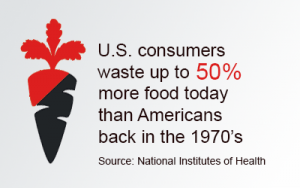
Think back upon the last time you took a 90-minute shower. You are likely saying to yourself incredulously, “I have never taken a 90-minute shower unless you count my last hike in the Hoh Rainforest.” The next step in this thought experiment includes another question, when was the last time you threw out a hamburger? Incredulousness abounds and you say to yourself, “What does hamburger have to do with a 90-minutes shower?” The cold hard truth is we consume the same amount of resources when you take a 90-minute show or throw away one hamburger patty.
Comparisons of a shower to a hamburger seems like an odd analogy but I am convinced that changing the way we view food waste is a key component in understanding the stark realities of continuing the path we are on. Key pieces of information are missing if we don’t consider the embodied energy in our food, the resources it takes to deliver that local (or far away) food to our tables, and the consequences of wasting it so haphazardly. In many developed countries, the price of food is relatively cheap and is a contributing factor of why we fail to recognize food production as a resource-intensive industry.
Here are a few more thin gs to ponder. Nearly 25% of all the fresh water used in the United States is used for the production of food we waste – enough to provide fresh water to 500 million people. We must protect agricultural lands but we also must protect the steams, alluvial fans and wetlands that provide habitat. We are putting increasing pressure on both sets of land because approximately 30% of the agricultural lands in use today are for producing food that never eaten. Wasted food accounts for 4% of the United States ENTIRE energy usage.
gs to ponder. Nearly 25% of all the fresh water used in the United States is used for the production of food we waste – enough to provide fresh water to 500 million people. We must protect agricultural lands but we also must protect the steams, alluvial fans and wetlands that provide habitat. We are putting increasing pressure on both sets of land because approximately 30% of the agricultural lands in use today are for producing food that never eaten. Wasted food accounts for 4% of the United States ENTIRE energy usage.
One of the ironic things about food waste, in terms of sustainable practices, is that we as individuals and businesses can make relatively easy changes to our lifestyle and purchasing habits to make a difference. A big budget for capital improvements like a high-efficiency furnace or a solar array is not necessary.

Here are a few of my favorite ways to reduce food waste
- Make trips that are more frequent to the grocery store, purchasing smaller quantities.
- Plan a week menu and shop for specifics – check you fridge first for items you may need.
- Set up an “Eat Me First Bin” in your fridge for items nearing the end of their days.
- If leftovers or other foodstuffs are nearing their expiration, freeze them (date and label them).
- Bring a reusable container when you eat out in the event of leftovers.
Focus on the value of your food and better habits are sure to follow. Each of us taking small steps add up to large gains!
